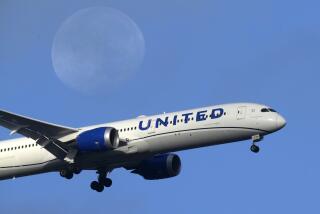Column: United Airlines takes a new step to make air travel more unpleasant and more expensive
Airlines are even better than banks at squeezing customers with higher fees and lousier service while claiming itâs in the interest of âserving you better.â
But United Airlines may have retired the trophy with an announcement Tuesday of a new fare, baggage and seating policy, which it says is aimed at becoming the âbest airline for employees, customers, and investors.â
Donât be fooled by the order in which those stakeholders are listed. The investors are the people who count; employees and â especially â customers are going to become collateral damage.
We are giving our customers an additional travel option from what United offers today.
— United executive Julia Haywood describes how the airline will give customers the option to be tormented
Starting early next year, United will introduce a new âbasic economyâ fare. Though this is expected to be roughly comparable to its lowest fares today, those passengers will be forbidden from bringing aboard any carry-on other than âa shoulder bag, backpack, laptop bag or other small item,â to be stowed under the seat. Full-size carry-ons, such as those with wheels, wonât be allowed.
Passengers traveling on these fares wonât be permitted to select seats in advance. Theyâll be automatically assigned seats at check-in âwith no opportunity to change,â and automatically be assigned to group 5, the last passengers to board. Think of it as a ticket to the middle seat.
They still will get a snack, however.
Unitedâs initiative is part of a financial strategy that includes deferring the purchase of as many as 61 new aircraft, all aimed at adding $4.8 billion a year to its bottom line.
The fare restrictions are sure to grab the most attention. Hereâs how Julia Haywood, Unitedâs chief commercial officer, described this breakthrough in customer relations: âUnitedâs customers have told us that they want more choice and Basic Economy delivers just that. By offering low fares while also offering the experience of traveling on our outstanding network, with a variety of onboard amenities and great customer service, we are giving our customers an additional travel option from what United offers today.â
Make no mistake: Unless United offers a significant discount for the basic economy fare, this is a price increase. The new fare will become the benchmark, and todayâs economy fare is almost certainly destined to rise. Basic economy passengers with suitcases will have no choice but to check them, at a fee of $25 (for the first checked bag). Does anyone doubt that the airline, thirsting for more revenue, eventually will jack that fee higher? Back in 2014, United shrank the permissible dimensions of carry-ons, but thereâs plenty of room to shrink them further. So even if the new fare is discounted, United will take back the savings via baggage fees.
Add the indignity and inconvenience of not choosing a seat in advance. United says basic economy passengers traveling as a group will have to acknowledge at the moment of purchase that they have no right to be seated together.
United is touting its new fare with all the transparent flapdoodle available to corporations with big PR staffs. It asserts that its new system âprovides the added benefit for customers and employees of simplifying the boarding process, as fewer customers will bring overhead bags on board.â
What should concern air travelers is that airlines will continue to strip away amenities, or charge extra for them (which is essentially the same thing). United is not the first major airline to roll out a âbasicâ fare. Delta already has done so, though the only amenity its basic passengers give up appears to be seat selection; they arenât subjected to additional baggage restrictions and still are entitled to overhead bin space. American Airlines has announced plans to introduce a no-frills plan next year, but hasnât offered details.
Do passengers really appreciate the âchoiceâ and âoptionsâ offered via these fares? Plainly, the answer is no. Spirit, Allegiant and Frontier, the three leading no-frills airlines, consistently rank among the most detested, chiefly because their fees-for-everything policies give passengers the impression of being nickel-and-dimed out of the budget category. Allegiant charges up to $80 for seat selection, up to $8 to buy a ticket with a credit card, $5 to print a boarding pass at the airport, and up to $75 for a carry-on bag.
There can be no doubt about who reaps the rewards of such cheeseparing. Itâs not the passengers. Unitedâs shares opened Tuesday 7% higher than Mondayâs close, though they fell back to close at $66.06, a gain of 4.98%.
Keep up to date with Michael Hiltzik. Follow @hiltzikm on Twitter, see his Facebook page, or email [email protected].
Return to Michael Hiltzikâs blog.
MORE FROM MICHAEL HILTZIK
Paul Ryan is determined to gut Medicare. This time he might succeed
With Trumpâs election, is stimulus spending back on Washingtonâs agenda?
More to Read
Inside the business of entertainment
The Wide Shot brings you news, analysis and insights on everything from streaming wars to production â and what it all means for the future.
You may occasionally receive promotional content from the Los Angeles Times.











